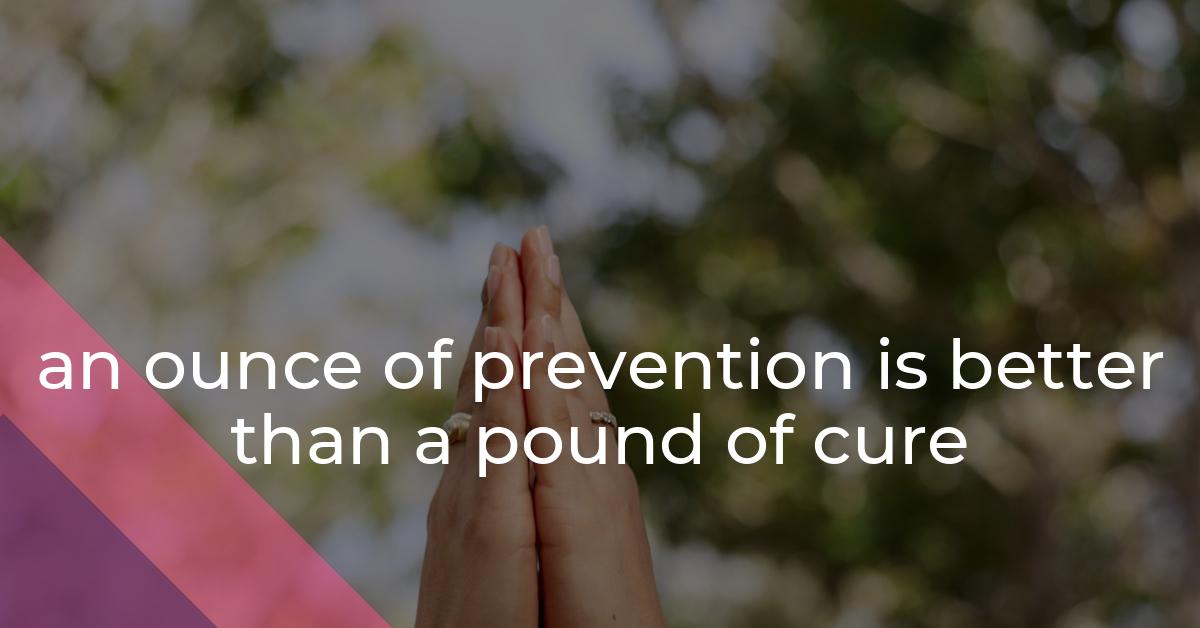an ounce of prevention is better than a pound of cure: Idiom Meaning and Origin
What does ‘an ounce of prevention is better than a pound of cure’ mean?
An ounce of prevention is better than a pound of cure means that it is more effective to try and stop a problem before it happens rather than trying to fix it after it has occurred.

Idiom Explorer
The idiom "lesser of two evils" means choosing between two unfavorable options while selecting the one that is considered less harmful or negative.
The idiom "least said, soonest mended" means that it is best to say as little as possible about a problem or difficult situation, as this will allow it to be resolved more quickly.
To "learn to walk before one can run" means that it's important to master the basic skills or knowledge before attempting more advanced or complex tasks.
The idiom "keep the wolf from the door" means to have enough money or resources to provide for one's basic needs and avoid poverty or hunger.
The idiom "jump before one is pushed" means to take action or make a decision before being forced or pressured to do so. It implies being proactive and avoiding negative consequences by acting preemptively.
"It can't be helped" means that there is no way to change or improve a situation, so it is better to accept it without trying to find a solution.
The idiom "had better" is used to advise or warn someone about a particular action they should take in order to avoid a negative outcome. It implies a sense of urgency or necessity, often indicating that there may be negative consequences if the suggested action is not followed.
The idiom *glass-half-full* refers to having an optimistic outlook on life or a positive attitude, focusing on the positive aspects of a situation rather than the negatives.
Outsmarting Trouble: Success Recipe
The idiom "an ounce of prevention is better than a pound of cure" expresses the idea that it is easier and more effective to prevent a problem or illness than to deal with it after it has occurred. This popular phrase has its origins in the medical field and has been widely used in various contexts, conveying the importance of taking proactive measures to prevent undesirable outcomes.
The idiom can be traced back to the 17th century, with its earliest documented appearance in the form of "an ounce of preventions is better than a pound of cure" in a political pamphlet written by Thomas Francklin in 1736. However, its true origin can be found in the medical field, more specifically in the advice given by Benjamin Franklin in his 1735 article titled "Plain Truth."
Franklin, who had a deep understanding of science and health, used the idiom to emphasize the significance of focusing on preventing diseases rather than just treating them. In his article, he argued that it was more beneficial to invest time and effort in preventative measures, such as maintaining a healthy lifestyle and practicing good hygiene, rather than relying solely on curing diseases.
The idiom has a direct correlation to other idioms such as "had better," "it can't be helped," "jump before one is pushed," "easier said than done," and "lesser of two evils." These idioms all revolve around the concept of taking action or making choices to avoid negative consequences.
"Had better" is used to indicate that it is advisable or preferable to take a particular course of action in order to prevent problems or achieve desired outcomes. Similarly, "it can't be helped" suggests that a situation or outcome is inevitable or unavoidable, emphasizing the importance of taking preventative measures beforehand.
"Jump before one is pushed" implies that it is better to take proactive action in a difficult or uncertain situation before being forced to do so by external circumstances. This aligns with the idea that prevention is more desirable than dealing with the consequences of neglect or inaction.
"Easier said than done" acknowledges the challenges and difficulties associated with taking preventative measures. It highlights the importance of recognizing the effort and commitment required to prevent problems and underscores the value of prioritizing prevention over reaction.
"The lesser of two evils" refers to making a choice between two undesirable options. It emphasizes the importance of considering the potential consequences and making proactive decisions to avoid more severe or harmful outcomes.
The idiom "an ounce of prevention is better than a pound of cure" originated from the medical field and underscores the importance of taking preventative measures to avoid issues or complications. Its enduring relevance in various domains emphasizes the value of foresight and preparedness. By promoting a proactive mindset, the idiom serves as a valuable reminder to prioritize prevention over reaction. It remains a timeless piece of advice applicable to a multitude of situations, urging individuals to invest in prevention to achieve desirable outcomes and avoid the unnecessary burden of dealing with the consequences later on.
Example usage
Examples of how the idiom "an ounce of prevention is better than a pound of cure" can be used in a sentence:
- Taking regular exercise and maintaining a healthy diet is an ounce of prevention that can help avoid many health problems.
- Installing a security system in your house is an ounce of prevention against burglaries.
- Wearing sunscreen every day is an ounce of prevention that can prevent skin damage and reduce the risk of skin cancer.
More "Prevention" idioms



